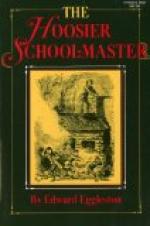“To be sure,” said Pearson.
Squire Hawkins, turning his right eye upon him, while the left looked at the ceiling, said: “Be careful, Mr. Pearson, or I shall have to punish you for contempt.”
“Why, Squar, I didn’t know ‘twas any sin to hev a healthy contemp’ fer sech a thief as Jones!”
The Squire looked at Mr. Pearson severely, and the latter, feeling that he had committed some offense without knowing it, subsided into silence.
Bronson now had a keen sense of the direction of the gale.
“If the court please,” said he, “I have tried to do my duty in this case. It was my duty to prosecute Mr. Hartsook, however much I might feel assured that he was innocent, and that he would be able to prove his innocence. I now enter a nolle in his case and that of John Pearson, and I ask that this court adjourn until to-morrow, in order to give me time to examine the evidence in the case of the other parties under arrest. I am proud to think that my efforts have been the means of sifting the matter to the bottom, of freeing Mr. Hartsook from suspicion, and of detecting the real criminals.”
“Ugh!” said Mr. Pearson, who conceived a great dislike to Bronson.
“The court,” said Squire Hawkins, “congratulates Mr. Hartsook on his triumphant acquittal. He is discharged from the bar of this court, and from the bar of public sentiment, without a suspicion of guilt. Constable, discharge Ralph Hartsook and John Pearson.”
Old Jack Means, who had always had a warm side for the master, now proposed three cheers for Mr. Hartsook, and they were given with a will by the people who would have hanged him an hour before.
Mrs. Means gave it as her opinion that “Jack Means allers wuz a fool!”
“This court,” said Dr. Underwood, “has one other duty to perform before adjourning for the day. Recall Hannah Thomson.”
“I jist started her on ahead to git supper and milk the cows,” said Mrs. Means. “A’n’t a-goin’ to have her loafin’ here all day.”
“Constable, recall her. This court can not adjourn until she returns!”
Hannah had gone but a little way, and was soon in the presence of the court, trembling for fear of some new calamity.
“Hannah Thomson”—it was Squire Underwood who spoke—“Hannah Thomson, this court wishes to ask you one or two questions.”
“Yes, sir,” but her voice died to a whisper.
“How old did you say you were?
“Eighteen, sir, last October.”
“Can you prove your age?”
“Yes, sir—by my mother.”
“For how long are you bound to Mr. Means?”
“Till I’m twenty-one.”
“This court feels in duty bound to inform you that, according to the laws of Indiana, a woman is of age at eighteen, and as no indenture could be made binding after you had reached your majority, you are the victim of a deception. You are free, and if it can be proven that you have been defrauded by a willful deception, a suit for damages will lie.”




